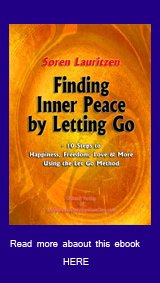How to Forgive Yourself
• Forgiveness is a skill we can learn, and so is self forgiveness
•
Research shows that being unforgiving will damage your health
• Learning how
to forgive yourself is definitely worthwhile! Read on ...
Forgiving yourself may just be even more important than forgiving others, because if you cannot forgive yourself then forgiving others (and life itself) becomes very, very hard.
Furthermore ALL forgiveness is more about ourselves than about anything or anyone else. YOU are the primary benefactor of your own forgiveness.
In short: If you are interested in forgiveness, learning about how to forgive yourself is an excellent place to start!
Of course, as an alternative, getting into the daily habit of forgiving others is ALSO a fine way of learning self forgiveness. Do unto others as you would have them do unto you, and as you do it often enough, you will find that it is easier to forgive yourself!
In case you're more interested in different angle on forgiveness, I would like to direct your attention to the pages What Is Forgiveness and How to Forgive, Examples of Forgiveness - Learning to Forgive as well as Forgiveness Quotes .
The Negative Voices inside Our Heads
Most of us know the phenomenon of an inner voice that professes to want to help us but which is terribly judgmental and generally obsessed with being overly critical of us. It is, in other words, beating us up.
Oftentimes that inner voice also judgmentally narrates our every move (both before it happens, as it happens and after it has happened), thus effectively turning our life experience into some kind of cheap secondhand pulp fiction story instead of the wonderful, intense here-and-now experience that it actually is.
Though most people are only aware of a single inner voice, in fact we all have several distinctly different inner voices. This is true even though we are perfectly mentally healthy - there is absolutely nothing shizophrenic about having one or more such inner voices.
That said we are actually better off without that critical inner voice, or at least we are better off if we have the tools and techniques to handle them properly. Drs. Hal and Sidra Stone have pretty much specialized in those inner voices, and they have developed the self help technique called Voice Dialogue to deal constructively with them. Reading their books is highly recommended.
Anytime you want clarity looking through a simple set of lenses called fear versus love is a nice tool to use ... Just look at something (anything) and ask yourself: 'Is this based in love or fear?'
If it is based in love all is well, and if it's based in fear, you need to either avoid it or turn it on its head so it becomes love based instead.
When we look at what our critical inner voice is saying it becomes abundantly clear that it is based in fear - it keeps yammering about all the negative, terrible things that can happen and how you need to be different in order to be OK (or even: perfect) and do better in order to not be a loser (or some such nonsense).
Also, much of what the inner voice has to say is based on fear's close cousins: shame, stress, hate, disgust and guilt.
Apart from making you stupid (a hallmark of fear), studies and research at e.g. Stanford University have shown that shame, guilt, stress, anger, hate, and other fear based emotions can cause or worsen diseases, such as autoimmune disorders, ulcers, heart disease and cancer. On top of that come several unpleasant mental conditions such as anxiety and depression.
All that is no good at all; what you need is to forgive yourself.
Why We Don't Forgive Ourselves
Why don't we forgive ourselves? Because we don't want to. Why don't we want to forgive ourselves? For a whole host of reasons - many of them completely asinine!
First off, we may be in denial. We don't want (or aren't able) to acknowledge that what we did (or: didn't do) was wrong or that it hurt ourselves or someone else. We're scared to face the consequences of our actions, so we deny the facts to protect ourselves.
Secondly, we may be busy projecting. The two basic ways that you might be projecting something are: a) from you onto someone else (making it difficult for you to forgive others for something you yourself did) and b) from someone else onto you yourself (making it difficult for you to forgive yourself for something others did). Either way you get to avoid placing responsibility where it belongs.
Thirdly, we may be motivated by what we think are other people's expectations. The thing is, though, that not only do we not have any control over what other people think, feel do and say, we don't actually KNOW what their feelings, thoughts and expectations of us are. And furthermore, other people are just as prone to projecting as we are - so when they actually DO state their feelings, thoughts and expectations of you, they almost always do so because of THEIR OWN fear, guilt and shame (usually what they think of as their own imperfections and shortcomings).
Fourthly, we may suffer from perfectionism and false pride - too high expectations of ourselves. Many times we do not allow ourselves to make mistakes and to fail. So when we do - and we all do, over and over again - it seems intolerable. Nobody is flawless and perfect, you know, and holding yourself to a standard of perfection is SURE to put you down. Forgiveness and self forgiveness, on the other hand, is humbling and brings with it the frightening possibility of unconditional acceptance (which leads up to the next point, below).
Fifthly, we may suffer from fear of the unknown. Some people are so used to feeling guilty and ashamed, that they don't want to leave that state of being. At least (they feel) when they are guilty, the feelings are familiar and they know how they are expected to feel, think and behave. Consequently sometimes we'd rather stay trapped in our guilt and shame than walk out in the unknown of freedom, love and happiness.
Finally, and this one is a biggie, we may want to punish ourselves. In several cultures around the world, including the Western culture, we are unhealthily obsessed with 'right' vs. 'wrong' as well as punishment. Feelings like guilt and shame abound, and the pain and suffering of NOT forgiving yourself is supposed to be your punishment for whatever 'wrong' you think and feel you have committed.
Even though the one that we hurt might want to set us free with forgiveness, we cannot accept it because we feel like we don't deserve it and we aren't worthy of it. We think we deserve punishment, and if somebody else won't give that punishment to us, we'll give it to ourselves!
This, obviously, is stupid. A person who is suffering isn't a better person than a happy person - if anything quite the contrary.
If you've ever been around someone in chronic physical pain you will know how hard a time they have being 'nice' - the constant pain shortens their fuse and makes it difficult for them not to be judgmental and snap at others.
Hence, the more guilt, shame, anger, resentment, hate, stress and other painful, fear based emotions you allow yourself to entertain, the less of a 'good' and 'nice' person you are likely to be. And it doesn't matter who those negative feelings are directed at, be it you or other people, they still make you more unpleasant to be around than you would have been had you gone through the process of (self) forgiveness.
Instead of an open, loving, vulnerable heart, we let our hearts become defensive, closed-off, contracted and fear-filled.
Of course, self-loathing and a lack of forgiveness may in fact protect you somewhat from being hurt in exactly the same way again - since self-loathing and a lack of forgiveness is tantamount to putting yourself in a deep, dark, lonely dungeon with thick walls that no one else can penetrate.
However, you may well get hurt again in a manner that is not the same but surprisingly similar; it's like 'if you don't get the lesson, variations on it will be repeated until you do.' Life is funny that way.
Also, forgiveness is NOT condoning the wrongdoing, or forgetting what happened, nor is it a lack of accountability / responsibility or 'being weak' in any way ... it is a way to get out of the role as a victim and to empower ourselves .
In actuality, there are several other reasons as well, why we don't want to forgive ourselves. You can read the part called 'Our Cultural Heritage Confuses Us' on the page 'What Is Forgiveness' to find more interesting reasons for lack of forgiveness and, by inference, self forgiveness.
What Is Self Forgiveness About?
Basically, there are two levels of self forgiveness: Self acceptance
and self forgiveness.You need to:
a) accept yourself for what you are,
and you need to:
b) forgive yourself for some specific things you may have done.
If you don't like who and what you are, you may be able to change that. But in order to change something you first need to see it for what it really is.
If you don't accept something, you're flying blind, and the changes you make, if indeed you even succeed in making any, may well be the opposite of what you wanted.
So, unless you accept yourself fully as who and what you are right now, you will not be able to make any conscious, positive changes to who and what you are. The first step to any change is always acceptance of what currently is. After that, it's a question of personal development.
The second step is actual self forgiveness. That is much more specific than acceptance. It's never about who and what you are, it's always about what you have done (or neglected to do). So, how do you forgive yourself?
10 Steps to Self Forgiveness
Forgiveness is a decision and therefore it doesn't have to take long at all, but oftentimes forgiveness is more of an ongoing process that takes time because you need to go through phases as you convince yourself that letting go and forgiving yourself is a good idea (as well as being the high road to setting yourself free and finding inner peace).As you complete the self forgiving process, you may be able to do some steps much quicker than others, this is normal. Furthermore you should consider going through all of the below steps to forgiveness more than once - again and again until you are able to fully forgive yourself. Just like with any other type of forgiveness, writing things down - and perhaps also talking to a non-judgmental friend (or a mental health professional) is a good idea.
Here is a brief overview of all the 10 steps:
1. Make a commitment to feel better
2. Count the cost - both of what happened AND of your unforgiveness
3. Attribute responsibility - to others, to life itself, and to yourself
4. Feel your feelings in their fullness - and express them. State what is not okay
5. Check your personal boundaries - and set + enforce better ones
6. De-monsterize the other (the offender)
6.1. De-monsterize life
6.2. De-monsterize yourself and let go of the guilt and shame
7. Realize that you're telling a story of grievance - and stop doing it
8. Relinquish revenge, retribution and even justice
9. Perform a ritual of forgiveness (and, if applicable: apologize)
10. Practice mindfulness and live each day as if it were both your first and your last
The steps to self forgiveness outlined above are exactly the same as the 10 steps to forgiving others which are described in detail on the page How to Forgive Please check out that page for detailed info and instructions.
Final Words
We can learn how to forgive both others and ourselves. It is largely a question of practice, so the more we do it, the better we get at it. You can practice self acceptance (of who and what you are) as well as self forgiveness (of what you've done) until self forgiveness becomes your daily habit, a beautiful art. It will benefit you immensely, so give it a try, okay?
The Personal Development Guy's Self Improvement Ezine (FREE)
Would you like to keep in touch - and get high-level tips and special bonuses? Then please sign up for my self improvement newsletter The Personal Development Guy's Self Improvement Ezine. It is totally FREE.
I LOVE Your Support
If you've found the free personal development content on this website useful, please click the Donate button. Your donation will help me to keep producing free, high-level self improvement information. I am VERY GRATEFUL for your support!
Inspirational Quotes, Poems and Funny Short Stuff
If you want, you can also get your personal development, spirituality and general wisdom in an ultra light version - or even add your own wisdom to the site. Just go to the other sister of this website at:
- World's Best and YOUR Best Quotes, Poems and Short Funny Stuff
Quotescoop.com is also known as:
(http://www.inspirational-quotes-short-funny-stuff.com).
High-Level Positive Parenting Advice and Deep Insights
Positive Parenting Ally is the parenting equivalent of the Personal Development Guy. This is where you go if you want really deepen your understanding of parenting, empower your kids and make everyday life more easy and joyful.
Positive-Parenting-Ally.com
- Parenting advice for the conscious, open-minded parent!
Back to the top of this page about Self Forgiveness - How to Forgive Yourself
Where Would You Like to Go Next?
To see what has been added to this site recently (plus offers, etc.), check out Blog & News at thePersonalDevelopmentGuy.comTo share your own short self improvement ideas, tips, musings, quotes, stories, spiritual jokes, etc. (and read the short ideas, etc. others have shared) jump to Shared Blog: Self Improvement Ideas
List of all the subpages to the main page Letting Go:
A Lesson in Letting Go and Letting God, Ebook Finding Inner Peace by Letting Go, Finding Inner Peace - How to Find Inner Peace by Accepting Yourself and Reality , What is Forgiveness?, How to Forgive, Forgiveness Qoutes, Self Forgiveness, Learning to Forgive, Lose Your Inhibitions , Sell Your Soul? Soul Power and How to Sell Your Soul - or Not , Mini-course: the Let Go Method Ultra Light for thoughts , Lose Your Inhibitions, Sell Your Soul
List of all the subpages to the main page Empowerment Theory: Hierachy of Needs, Power of Belief, Absolute Reality, Perception is Reality, Construction of Reality, What is Reality , What is Forgiveness?, How to Forgive, Forgiveness Quotes , Self Forgiveness, Learning to Forgive.
Jump to the Personal Development Guy Homepage







